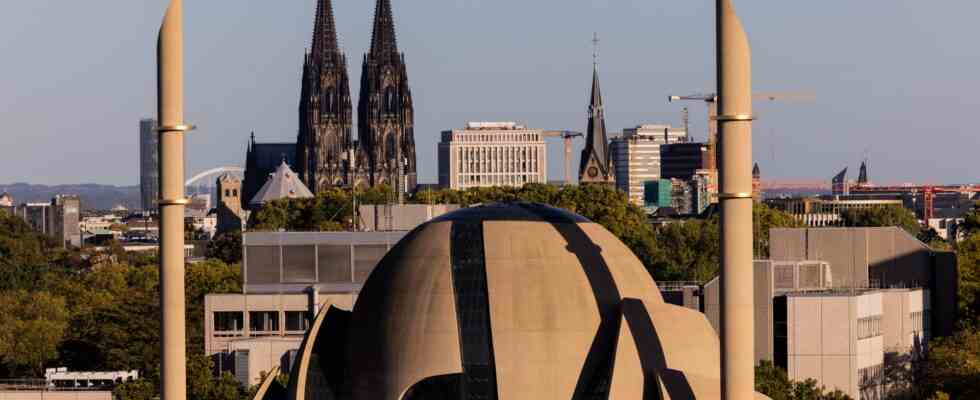Status: 10/14/2022 8:57 a.m
The Turkish-Islamic Union DITIB in Cologne can now for the first time have the muezzin called to prayer via loudspeaker: a maximum of five minutes and with a limited volume. But there is still criticism of the plan.
“The public call to prayer is a sign that Muslims feel at home,” says Abdurrahman Atasoy of the Turkish-Islamic Union DITIB and welcomes the agreement with the city of Cologne. “This is an important step in the perception of the Muslim faith community as part of society.” At around 1:24 p.m., the muezzin will publicly call for Friday prayers for the first time at the Cologne Central Mosque in the Ehrenfeld district.
Two small speakers are mounted at the top of the large wooden door at the main entrance. According to the city of Cologne, the call must not be louder than 60 decibels and will probably only be audible over the loudspeakers as far as the pedestrian walkway at the mosque. It’s about Friday, it’s about five minutes at lunchtime.
But how much religion can the public take? So far, the muezzin has been calling for Friday prayers without a loudspeaker. The city of Cologne justifies the project with tolerance and the right to practice religion. Islam has been an integral part of German society for many years, says Cologne’s Mayor Henriette Reker: “When we hear the call of the muezzin in addition to the church bells in our city, it shows that diversity is valued and lived in Cologne.”
Refusal for muezzin call
But the project, which was actually supposed to be a sign of integration, had also caused criticism and upheaval. When the central mosque in Cologne was voted for in 2008, DITIB assured that the muezzin calling the faithful to prayer would not be heard outside the mosque grounds.
“The ringing of the bell and the call to the muezzin have a similar function, but the rejection of the latter is often stronger,” says sociologist of religion Detlef Pollack from the University of Münster. The muezzin calls to prayer, the bells to the service. “Despite all criticism of the church, many have sympathy for Christianity as a foundation of our culture. The ringing of the bells is perceived as part of this culture.” The muezzin call, however, is perceived by some as something alien that does not belong to our culture. “A considerable part of the population does not see Islam as an enrichment of our culture, but as something threatening,” says Pollack.
And yet the Cologne example is not new. The call is already common in around 30 mosque communities, for example in Krefeld, in Raunheim in Hesse or in Oer-Erkenschwick on the northern edge of the Ruhr area.
“Demonstration of power of political Islam”
The Berlin Islamism researcher Ahmad Mansour fears “fatal consequences” from the reputation planned in Cologne. “This is a demonstration of the power of political Islam,” says Mansour. He considers DITIB to be the extended arm of the Turkish religious authority in Ankara and recalls that President Recep Tayyip Erdogan personally opened the central mosque in Cologne-Ehrenfeld.
“It is devastating that this organization of all people is now being given such public recognition,” says Mansour. The ringing of the bells is about sound, the calling of the muezzin is about concrete religious messages and ideology.
It is a model project in Cologne limited to two years, in which a number of other mosque communities have expressed interest.
Muslims visible as part of the city and society
“We also spoke in the community about whether this is necessary and whether we should also apply to the city,” says the imam and theologian Mahmood Malhi from the Bait-un-Nasr Mosque in Cologne. “We attach great importance to not disturbing our neighbors in Cologne and are committed to living together.” It is nice to see that the project shows that Muslims are a part of the city and of society.
He can only partially understand the criticism of the call via loudspeaker. “The muezzin calls at lunchtime when people are working and there’s a lot going on in the city and on the streets. It’s not a disturbance of the peace.” Unfortunately, there is always a headwind. “Nevertheless, I feel very comfortable in Cologne and love the people here because many are multicultural,” says Mahmood Malhi. Tolerance is shown and lived here. Every Friday in Cologne-Ehrenfeld we will see how loud it actually gets – and how the environment and neighborhood react when the idea of tolerance becomes audible reality.

